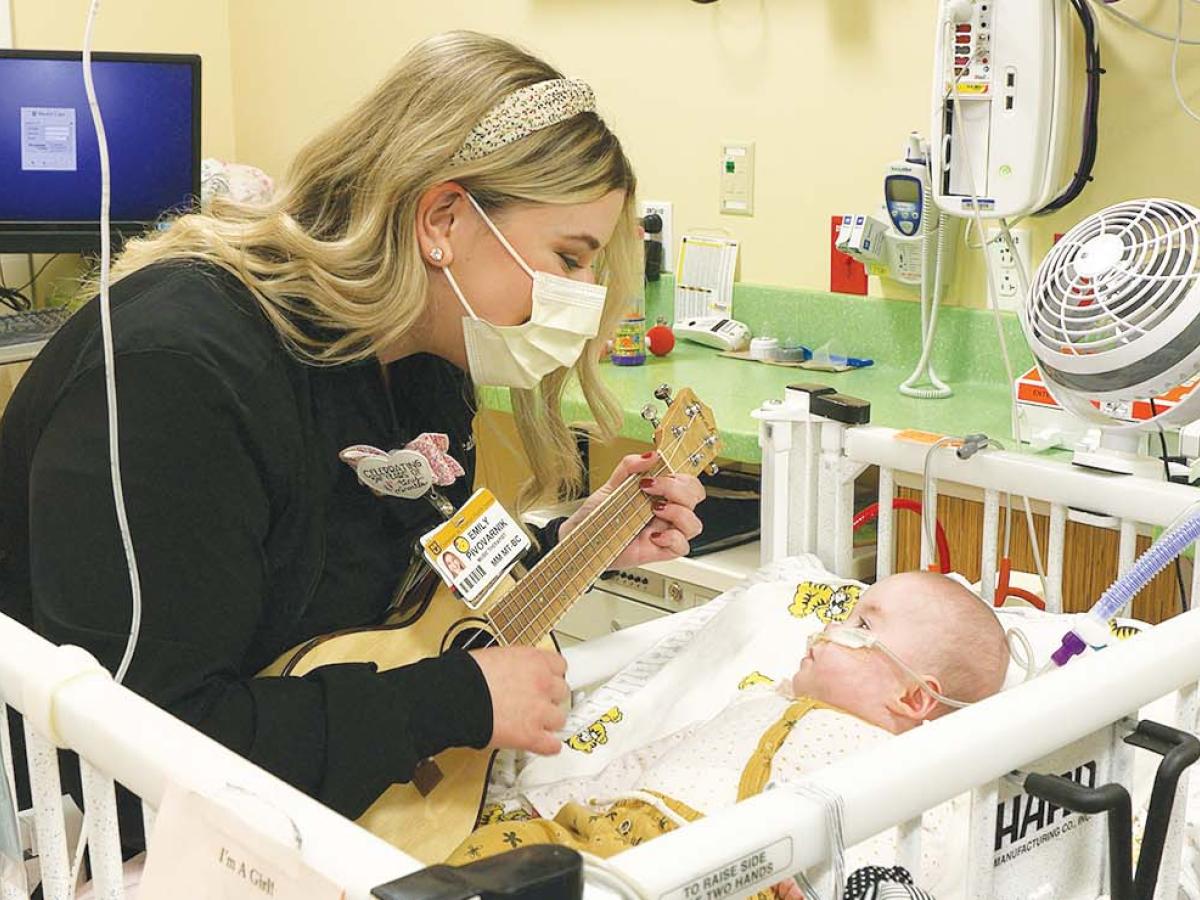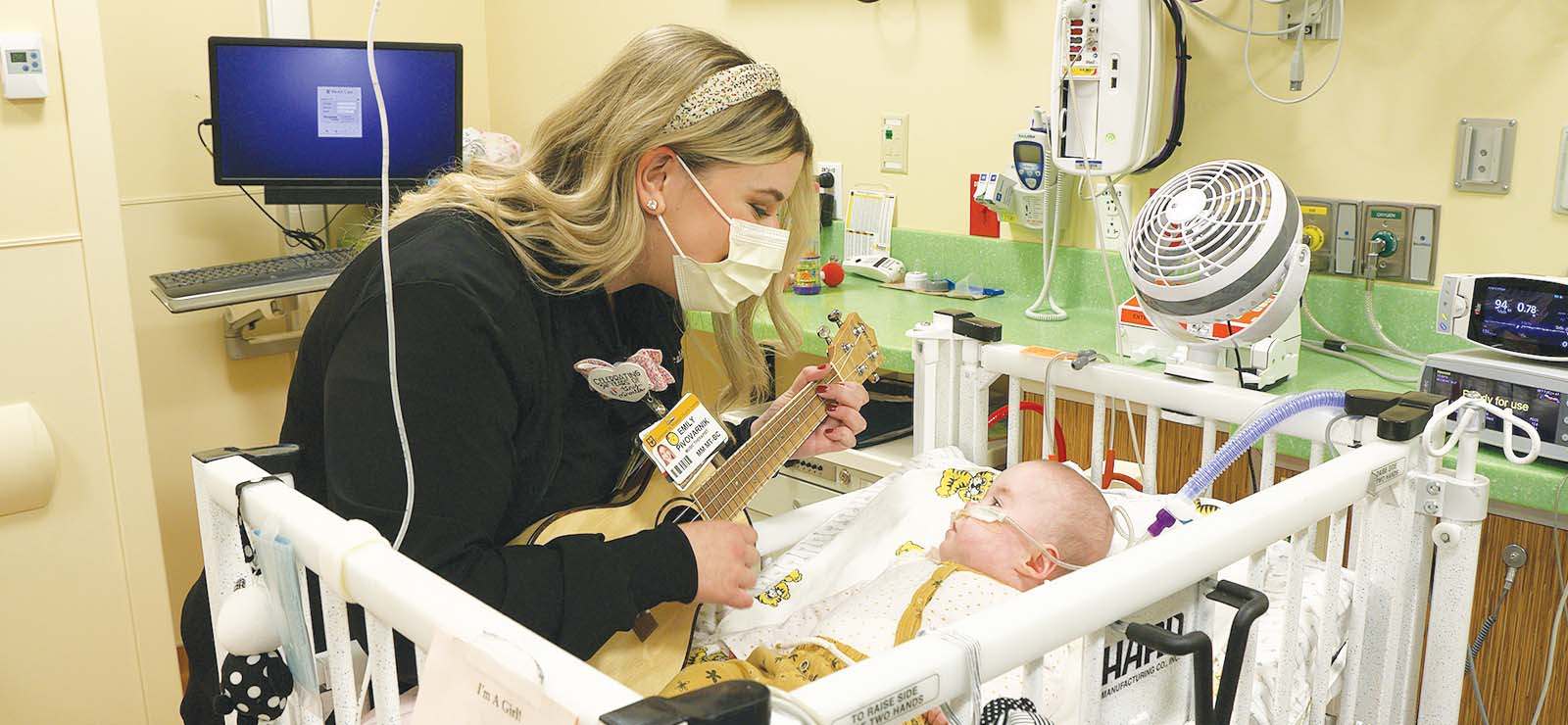February 22, 2022

Most parents use lullabies at one time or another to calm their children or soothe them to sleep. And as magical as "Twinkle, Twinkle Little Star" can be for stubborn toddlers at bedtime, its power in the neonatal intensive care unit (NICU) can be drastic — even lifesaving — for premature babies.
Each year in the United States, 1 in 10 children is born prematurely (before the 37th week of pregnancy). Not only do babies born that early tend to need a little extra care to help their underdeveloped organs grow, they also need their senses nurtured. The good news is that evidence-based NICU music therapy can improve the physical health of preemies while helping them adjust to life outside the womb.
What Is Music Therapy?
Music therapy is an intervention that uses music to alleviate pain, manage stress and promote wellness. It's especially beneficial for preemies because it protects their underdeveloped heart and lungs by lowering their heart rate and slowing down their breathing.
Premature babies can begin NICU music therapy when their gestational age is at least 27 weeks. And because music therapists are specifically trained to understand developmental milestones for preemies, they work directly with the medical team to incorporate music into the baby's care plan. The therapy can include live or recorded music and singing, and the stimulation it provides increases with the baby's sensory development.
Why Use Music Therapy for Premature Babies?
During the third trimester of pregnancy, babies get a lot of stimulation. They begin to recognize mom's voice and distinguish it from other sounds. They react to light when it shines on the womb. And they experience a full range of sensations, including temperature, pressure and pain. Without those weeks and sometimes months of in-womb development, a preterm baby misses the soft and gradual introduction to the stimulation of the outside world.
To further complicate matters, life in the NICU can be pretty stressful with all of the beeps, alarms, bright lights, pokes, prods and constant interruptions. As helpful and necessary as all of those medical interventions are, they can be hard on a newborn (and anyone else for that matter).
That level of overstimulation can cause a preemie's heart rate to increase and blood oxygen level to decrease, which is not ideal for developing organs. It can also make bonding with parents and caregivers difficult and cause feeding challenges. And these issues don't stay in the NICU: Early overstimulation can lead to sensory and neurological issues later in life.
How Is Music Therapy Used to Help Preterm Infants?
When done correctly by a board-certified music therapist, NICU music therapy can calm premature babies and nurture their underdeveloped senses. Therapists select music depending on the baby's gestational age and development, usually beginning with a quiet lullaby (often sung by the baby's mother) to soothe and remove outside stimuli. As a preemie develops, the music and intervention adjust to meet the baby's growing tolerance of stimulation. Research shows that lullabies, often in combination with touch, offer the most health benefits for preemies.
Common types of NICU music therapy include:
- Passive music listening: Soft lullabies (often sung by the mother) reduce stress and improve breathing in babies who are 28 gestational weeks or older.
- Multimodal neurological enhancement (MMNE): For babies who are at least 32 gestational weeks of age and medically stable, MMNE begins with a soft lullaby and then adds touching, movement and visual stimulation.
- Contingent music: For babies who struggle with feeding at 34 gestational weeks of age, live music — used alongside specialized pacifiers and other devices — encourages sucking by changing in response to the newborn's behavior.
Benefits of Music Therapy in the NICU
Successful music therapy is more than just playing music. A board-certified therapist carefully monitors the stimulation in the NICU to provide music therapy that is developmentally appropriate. Stimulation and therapy that correlate to the infant's gestational age and fetal development milestones offer benefits for both premature infants and their families:
Health effects for preemies
With NICU music therapy, babies experience immediate effects that support long-term development. During their time in the NICU, music therapy helps preemies:
- Decrease stress and crying resulting from discomfort and overstimulation
- Foster a stronger parent-child bond
- Improve breathing rate and oxygen saturation, so they don't need as much supplemental oxygen
- Increase the ability to suck and feed, promoting healthy weight gain
- Shorten length of NICU stay, often by seven to 10 days
- Slow heart rate
Parental benefits
Throughout treatment, therapists involve parents in their baby's care. Mothers and therapists often work together to create a personal lullaby for each newborn in the mother's voice.
Parental involvement in music therapy offers benefits for parents that include:
- Enhanced interaction and bonding with their baby
- A shorter NICU stay, associated with decreased cost
- Reduced stress, especially as confidence in parenting increases
- Support during the transition to home, as most parents continue weekly music therapy sessions after discharge
- Training, to reduce their child's overstimulation
Next Steps and Useful Resources
- Want to see how music therapy is being used at MU Health Care? Learn more about the music therapy program at Children's Hospital.


